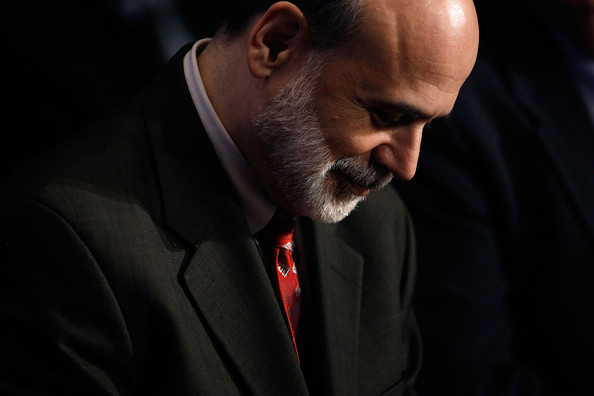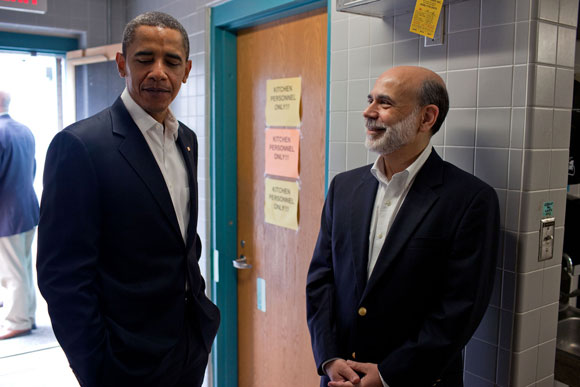Bernanke's WashPo Money-Printing Editorial PLUS A Brilliant Video Montage Of His Failed CNBC Predictions

Very unusual that a sitting Fed Chairman would pen a national op-ed in defense of dollar destruction, national-debt monetization, and wanton money printing. B-52 must be extra cheery this week as he prepares for the big bash at Jekyll Island. A unique photo plus Paul Krugman's latest insanity entitled 'If I were King Bernanke.'
It's a siren call for 5% annual inflation. Couldn't we just declare Krugman a ward of the State, so that we might be done with his pedantic, discredited babble.
---
Scroll down for VIDEO
---
What the Fed did and why: supporting the recovery and sustaining price stability
By Ben S. Bernanke
Thursday, November 4, 2010;
Two years have passed since the worst financial crisis since the 1930s dealt a body blow to the world economy. Working with policymakers at home and abroad, the Federal Reserve responded with strong and creative measures to help stabilize the financial system and the economy. Among the Fed's responses was a dramatic easing of monetary policy - reducing short-term interest rates nearly to zero. The Fed also purchased more than a trillion dollars' worth of Treasury securities and U.S.-backed mortgage-related securities, which helped reduce longer-term interest rates, such as those for mortgages and corporate bonds. These steps helped end the economic free fall and set the stage for a resumption of economic growth in mid-2009.
Notwithstanding the progress that has been made, when the Fed's monetary policymaking committee - the Federal Open Market Committee (FOMC) - met this week to review the economic situation, we could hardly be satisfied. The Federal Reserve's objectives - its dual mandate, set by Congress - are to promote a high level of employment and low, stable inflation. Unfortunately, the job market remains quite weak; the national unemployment rate is nearly 10 percent, a large number of people can find only part-time work, and a substantial fraction of the unemployed have been out of work six months or longer. The heavy costs of unemployment include intense strains on family finances, more foreclosures and the loss of job skills.
Today, most measures of underlying inflation are running somewhat below 2 percent, or a bit lower than the rate most Fed policymakers see as being most consistent with healthy economic growth in the long run. Although low inflation is generally good, inflation that is too low can pose risks to the economy - especially when the economy is struggling. In the most extreme case, very low inflation can morph into deflation (falling prices and wages), which can contribute to long periods of economic stagnation.
Even absent such risks, low and falling inflation indicate that the economy has considerable spare capacity, implying that there is scope for monetary policy to support further gains in employment without risking economic overheating. The FOMC decided this week that, with unemployment high and inflation very low, further support to the economy is needed. With short-term interest rates already about as low as they can go, the FOMC agreed to deliver that support by purchasing additional longer-term securities, as it did in 2008 and 2009. The FOMC intends to buy an additional $600 billion of longer-term Treasury securities by mid-2011 and will continue to reinvest repayments of principal on its holdings of securities, as it has been doing since August.
This approach eased financial conditions in the past and, so far, looks to be effective again. Stock prices rose and long-term interest rates fell when investors began to anticipate the most recent action. Easier financial conditions will promote economic growth. For example, lower mortgage rates will make housing more affordable and allow more homeowners to refinance. Lower corporate bond rates will encourage investment. And higher stock prices will boost consumer wealth and help increase confidence, which can also spur spending. Increased spending will lead to higher incomes and profits that, in a virtuous circle, will further support economic expansion.
While they have been used successfully in the United States and elsewhere, purchases of longer-term securities are a less familiar monetary policy tool than cutting short-term interest rates. That is one reason the FOMC has been cautious, balancing the costs and benefits before acting. We will review the purchase program regularly to ensure it is working as intended and to assess whether adjustments are needed as economic conditions change.
Although asset purchases are relatively unfamiliar as a tool of monetary policy, some concerns about this approach are overstated. Critics have, for example, worried that it will lead to excessive increases in the money supply and ultimately to significant increases in inflation.
Our earlier use of this policy approach had little effect on the amount of currency in circulation or on other broad measures of the money supply, such as bank deposits. Nor did it result in higher inflation. We have made all necessary preparations, and we are confident that we have the tools to unwind these policies at the appropriate time. The Fed is committed to both parts of its dual mandate and will take all measures necessary to keep inflation low and stable.
The Federal Reserve cannot solve all the economy's problems on its own. That will take time and the combined efforts of many parties, including the central bank, Congress, the administration, regulators and the private sector. But the Federal Reserve has a particular obligation to help promote increased employment and sustain price stability. Steps taken this week should help us fulfill that obligation.
The writer is chairman of the Federal Reserve Board of Governors.
---


 Nov 4, 2010 at 5:54 PM
Nov 4, 2010 at 5:54 PM
Reader Comments (6)
Puke on pos Bernanke!!
I’ve been asked by various people what I would do if I were Bernanke, and/or if I were in charge of the Fed. Those aren’t the same thing: Ben Bernanke isn’t a dictator, and the evidence suggests that he’d be substantially more aggressive in both his actions and his rhetoric if he weren’t constrained by the need to bring his colleagues with him.
http://krugman.blogs.nytimes.com/2010/11/01/if-i-were-king-bernanke/
From Falken Blog
By Eric Falkenstein
Nobel prize winner Paul Krugman may say it's econ 101 to have the federal government spend more in recessions, and I agree, but it's also wrong. The highly rigorous yet ultimately naively simplistic macro models have not been useful in rectifying this incorrect intuition, which remains dominant. Gone are the days like in 1920, when during a nasty recession, the federal government cut expenditure by half from 1920 to 1922, and the economy rebounded nicely. Historically, whenever we are in a recession, economists generally call for more fiscal spending, all the better if it is deficit financed. Yet as Milton Friedman noted, "The fascinating thing to me is that the widespread faith in the potency of fiscal policy … rests on no evidence whatsoever." Evidence no, theory, yes (currently, unemployment is 9.7%)
http://dailybail.com/home/krugman-keynes-are-wrong-fiscal-stimulus-never-works-as-inte.html
Despite our obvious excitement for these projects, how will any of this patronage actually help the economy recover?
Also missing from the debate is the concern for our children and the unconscionable debt burden we are leaving them. Keynesians, what value are you adding? Your insane belief in the power of government spending is painful entertainment for the rest of us who can smell the bull the minute you hit town. Where is the grand vision? Where is the vital infrastrucure? Why do these projects merit the borrowing of $1 trillion more from our children's increasingly dim futures? We're still waiting to hear how each project will further our national interest.
So stop wasting our time with your useless theory on how this giveaway will substantially boost the economy. We're not buying it. It didn't work in the 1930s and it's not going to work now. Are you listening, Krugman. The massive spending that accompanied our entrance into WWII brought us out of the depression. Not the keynesian claptrap you so proudly cite.
So call this stimulus what it really is, generational rape with a trillion-dollar shovel, and it's but one more painful wrong turn as we continue on the path to federal bankruptcy.
http://dailybail.com/home/bailout-news-stimulus-edition-generational-rape-with-a-trill.html
http://dailybail.com/home/cea-chair-christina-romer-well-do-whatever-it-takes-to-help.html